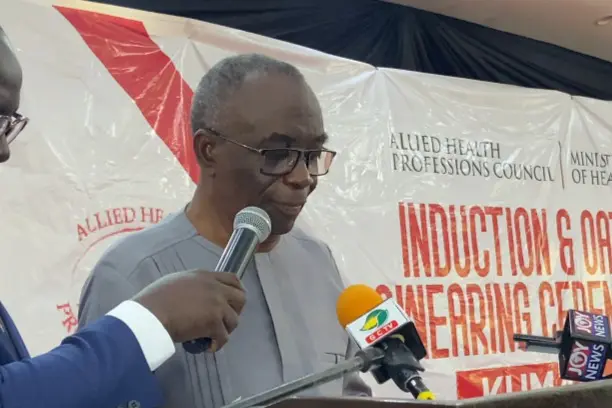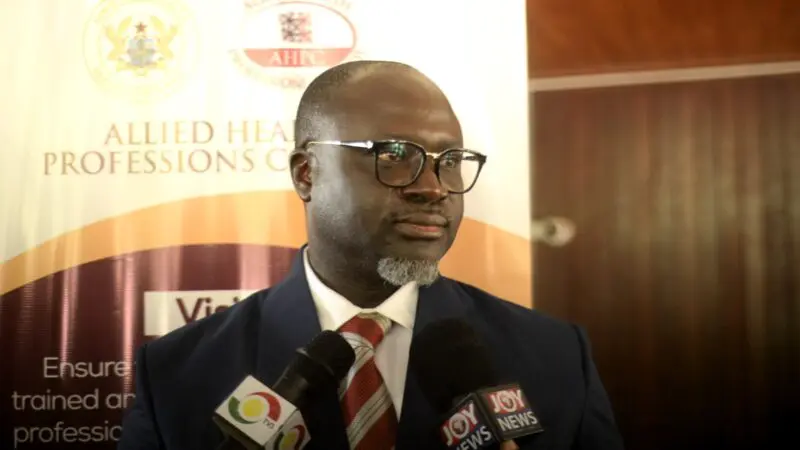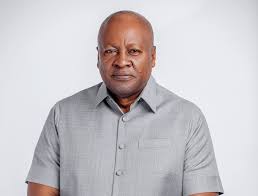Dr. Daniel Atta-Nyarko, the Acting Registrar of the Allied Health Professions Council (AHPC), has called on the government to address the growing imbalance in the recruitment of healthcare professionals, specifically within the allied health sector.
He emphasized the importance of equity and fairness in hiring processes, highlighting the detrimental effects of the ongoing brain drain in the industry, with many allied health professionals leaving the country in search of better opportunities abroad.
Speaking at an induction and oath-swearing ceremony for newly qualified allied health graduates in Kumasi, Dr. Atta-Nyarko noted that the relocation of healthcare workers had reached a critical level and that immediate action was required.
“As a matter of urgency, we need to take a critical look at the recruitment of health professionals, especially Allied Professionals in the country. I am not sure the government prioritizes other health professionals over others.”
Dr. Daniel Atta-Nyarko, Acting Registrar of the Allied Health Professions Council (AHPC)
The concern about unemployment among allied health professionals is not new but has become more pressing with the recent graduation of 2,536 newly qualified individuals into the sector.
These graduates represent a wide range of specialties, including medical laboratory science, physiotherapy, and radiography. While they are now licensed to practice, many face an uncertain future due to limited job openings in both the public and private healthcare sectors.
Dr. Atta-Nyarko further expressed concern about the growing number of trained allied health professionals who are unable to find suitable employment.
“The Council is therefore calling on the government to partner with us in streamlining the numbers of trainees to ensure quality training for quality service delivery,” Dr. Atta-Nyarko urged.
The induction ceremony, themed “Transforming Healthcare: Allied Health Professionals as Catalysts for Quality Improvement,” focused on the vital role these professionals play in shaping the future of healthcare in Ghana and beyond.
Dr. Atta-Nyarko underscored the importance of the oath that the new graduates were taking, urging them to uphold high ethical standards in their practice. “This ceremony is not just an acceptance into your profession but a reaffirmation of your commitment to excellence and ethical practice,” he said.
Dr. Atta-Nyarko reminded the graduates that their oath is a promise to deliver quality care, advocate for patients, and contribute meaningfully to the broader goals of improving healthcare outcomes in Ghana.
Call for Collective Action and Technological Integration

During the event, Consultant Medical Laboratory Scientist, Dr. Thomas Kwabena Gyampomah, emphasized the need for collective action among allied health professionals to push for reforms and improvements in the healthcare system.
“Transformational change in healthcare requires the collective focus of AHPs [Allied Health Professionals] to address all negative habits via policy changes and advocacy.
“With renewed dedication and commitment to duty, backed with continuing professional development, quality improvement in healthcare can become just a routine.”
Dr. Thomas Kwabena Gyampomah, Consultant Medical Laboratory Scientist
Dr. Gyampomah also highlighted the potential of technological advancements, including artificial intelligence (AI), to revolutionize the healthcare landscape.
According to him, embracing such innovations could empower allied health professionals to take on more prominent roles in leading healthcare transformation, ultimately resulting in better patient care and improved outcomes.
The AHPC’s advocacy for reforms in the recruitment process and better management of trainee numbers is a necessary step towards ensuring that the country’s healthcare system is not only well-staffed but also capable of delivering the highest standards of care.
However, achieving these goals will require concerted efforts from all stakeholders, including government agencies, healthcare institutions, and allied health professionals themselves.
Only through partnership and innovation can Ghana’s healthcare system meet the growing demands of its population while ensuring that its workforce remains motivated, adequately compensated, and committed to providing exceptional care.
READ ALSO: Bob-Manuel Udokwu Opposed to Idris Elba’s Cast in “Things Fall Apart” Adaptation



















